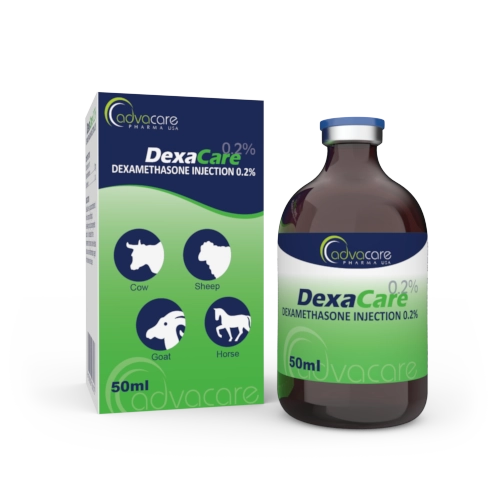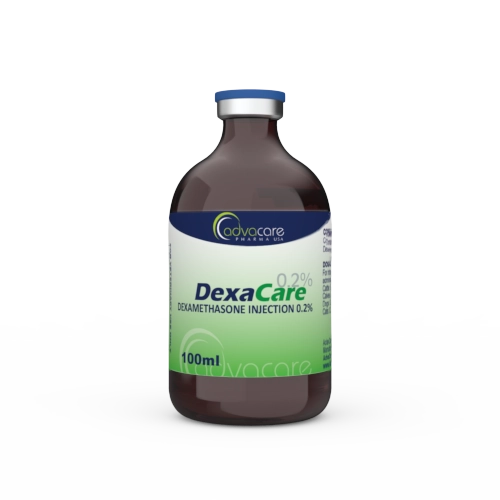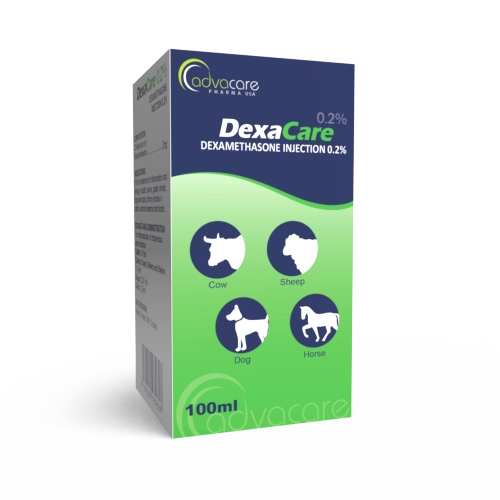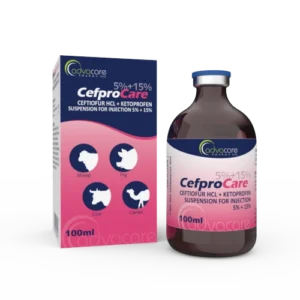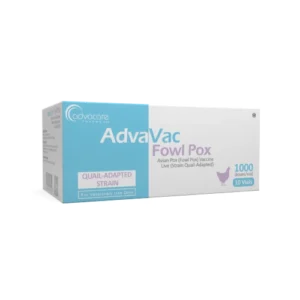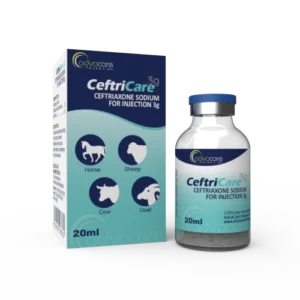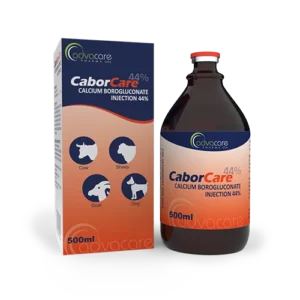What is Dexamethasone?
- Anti-inflammatory
- Camel,
- Cat,
- Dog,
- Cow,
- Goat,
- Horse,
- Sheep
Active Ingredients: Dexamethasone
Dexamethasone Injection is a corticosteroid drug used to treat inflammatory conditions in many types of animals, including cows, camels, cats, dogs, goats, horses, and sheep. It is indicated for ketosis, and it’s used to treat symptoms related to various rheumatic, allergic, and dermatologic diseases.
Dexamethasone belongs to a class of drugs known as corticosteroids. The active ingredient, dexamethasone, works to decrease the immune system’s response, which reduces symptoms like itching, swelling, redness, and allergic reactions. Being a strong anti-inflammatory agent, it targets multiple pathways in the inflammatory response. Its pharmacological action is more enduring and potent than naturally occurring corticosteroids, giving it a favorable profile for specific clinical scenarios.
The conditions that this drug is typically used for include rheumatoid arthritis, allergic reactions, and various skin disorders like eczema or dermatitis. In livestock, it has proven effective against bovine ketosis, a metabolic disorder in cattle. In horses, it is often utilized to alleviate symptoms of laminitis, a painful inflammation of the hoof.
When considering Dexamethasone Injection for animals, its pharmacokinetics and biodistribution should be understood. This medication has a rapid onset of action and a longer half-life than some other corticosteroids, allowing for sustained therapeutic effects. Its versatile formulation also enables it to be used both systemically and locally, depending on the clinical need.
It is important to note that Basil Hygiecare Dexamethasone Injection is for veterinary purposes only, and whilst there are types available for human use, you should only use the kind that has been prescribed by a veterinary doctor or animal care specialist for an animal. Administering the incorrect formulation or dosage can result in adverse effects or diminished therapeutic outcomes in the treated animals.
This product in particular stands out due to its adherence to rigorous quality standards. Tailored for managing inflammation, its straightforward mechanism provides rapid relief to afflicted animals. Veterinarians can rely on its consistent performance across a range of use cases, while its versatile formulation allows for adaptability in different scenarios.
Basil Hygiecare is a GMP-certified manufacturer of Dexamethasone Injections. We offer a broad range of high-quality veterinary medications available for distribution. Partnering with Basil Hygiecare ensures veterinarians and animal care providers access to reliable solutions for diverse animal health needs.
Why are we a trusted Dexamethasone manufacturer?
Dexamethasone Injection is manufactured and globally distributed by Basil Hygiecare, a leading manufacturer of veterinary injections in the pharmaceutical industry. We have been committed to distributing high-quality, GMP-certified veterinary medications for the global market over the past 20 years. As a top Dexamethasone manufacturer, we ensure that all of our 100+ veterinary injections surpass our distributors’ requirements by conducting routine internal and third-party facility audits.
Precautions
Do NOT use Dexamethasone Injection for animals that:
- have a known allergy or hypersensitivity to any of the ingredients.
- have impaired liver or kidney function.
- have diabetes or osteoporosis.
- are in their third part of gestation.
- are being treated for a viral or fungal infection.
- have systemic infections that are not being concurrently addressed.
- are experiencing gastrointestinal ulcers or have a history of them.
Treatment with this drug should be administered with caution in animals that:
- are pregnant or lactating.
- are at risk for diabetes mellitus (particularly cats).
- have recently undergone or are slated for surgery due to potential delay in wound healing.
- are suffering from congestive heart failure.
Do not administer a vaccine while the animal is undergoing treatment with a corticosteroid. Vaccination at this time may compromise the immune response, rendering the vaccine less effective or possibly increasing the risk of adverse reactions.
This drug should not be injected rapidly. Administering the medication too quickly can lead to hypotension (a sudden drop in blood pressure), which might require emergency intervention. Rapid injection may cause hemolytic anemia, a condition where the red blood cells are destroyed faster than they can be produced, compromising the animal’s ability to carry oxygen effectively. Ensure that the injection is delivered at a measured pace.
What are the most common animals Dexamethasone Injection is used for?
Veterinary professionals use Dexamethasone Injection for a wide range of animals, including:
- Cows: In cattle, Dexamethasone Injection is often used to treat bovine ketosis, a metabolic disorder. It can also help manage inflammatory conditions and promote parturition in late-term pregnancy.
- Dogs: In dogs, it is commonly administered to reduce inflammation and allergic reactions, such as those from bug bites or environmental allergens, and to treat autoimmune disorders.
- Cats: For felines, the drug provides relief from allergic reactions, skin irritations, and certain autoimmune conditions.
- Horses: The drug is regularly used in horses to alleviate symptoms of laminitis, a painful inflammation of the hoof, and to manage allergic reactions and inflammatory conditions.
- Sheep: Dexamethasone Injection is employed in sheep to address inflammatory ailments, treat allergies, and as a supportive therapy in various metabolic disorders.
Uses
What is Dexamethasone used for?
It’s also used to treat inflammation and inflammatory responses in both small and large animals. It is used to treat:
- bovine ketosis
- allergic reactions
- urticaria
- myoglobinuria
- toximenia
- shock
It is also used as a localized treatment for inflammatory problems such as:
- arthritis and peri-arthritis
- bursitis
- tendonitis
- tendovaginitis
What animals can be treated with Dexamethasone Injection?
This medicine is recommended for horses, companion animals, and livestock animals like cows, goats, and sheep.
How does the drug work?
Dexamethasone acts by mimicking the effects of natural corticosteroid hormones produced by the adrenal glands. It targets specific cells and receptors in the body, inhibiting the release of inflammation-causing substances. By suppressing both the inflammatory and immune responses, Dexamethasone manages and alleviates various inflammatory conditions.
How is a Dexamethasone Injection used?
This medication has been manufactured as a liquid, which is packaged in a vial. It is intended to be administered by intramuscular or intravenous injection. Using a sterile syringe and needle is crucial. Dexamethasone Injection is intended for veterinary use only.
How quickly can effects be seen after administering the injection?
The onset of action is rapid, with effects generally seen within hours, but the duration of effect can vary depending on the dose and the condition.
How is the dosage of Dexamethasone Injection determined?
The dosage depends on the severity of the condition being treated, the specific animal species, and its weight.
What is the withdrawal period for Dexamethasone when given by injection?
For meat, 21 days. For milk, 5 days. This means that after the last dose of Dexamethasone has been administered, one must wait 21 days before the meat of that animal is considered safe for human consumption. Milk produced by the animal should not be consumed for 5 days post-treatment.
What are the potential side effects of prolonged Dexamethasone use in animals?
Chronic use might lead to side effects such as immune suppression, muscle weakness, gastrointestinal disturbances, and changes in behavior or mood.
Is Dexamethasone safe for use in all age groups of animals?
The safety profile may vary with age. Younger animals might be more prone to certain side effects. Always consult a veterinarian before administering.
Is there any resistance reported with prolonged use?
Unlike antibiotics, resistance is not a typical concern with corticosteroids like Dexamethasone. However, prolonged or inappropriate use can lead to decreased efficacy, mainly due to changes in corticosteroid receptor responsiveness in the animal.
How does Dexamethasone compare to other corticosteroids in terms of potency?
Dexamethasone is more potent than many other corticosteroids, often requiring lower dosages to achieve similar therapeutic effects. It also has a longer half-life compared to medications like prednisone or hydrocortisone.
How should Dexamethasone Injection be stored?
This medication should be stored in a dark, dry location between 2-15°C. The vial should be sealed tightly when not in use. If the entire vial isn’t used in one go, the remaining solution should be stored in a cool, dry place, away from light. Note the date of opening and ensure the solution is used within the recommended time frame.
Dosage
How much Dexamethasone Injection should be given to cows?
The usual dose is 5-20mg, given IV/IM.
How much Dexamethasone Injection should be given to dogs or cats?
The usual dose is 0.25-1.0mg, given IV/IM.
How much Dexamethasone Injection should be given to horses?
The usual dose is 2-5mg, given IV/IM.
How much Dexamethasone Injection should be given to goats or sheep?
The usual dose is 0.1-0.3mg/kg, given IV/IM.
How much Dexamethasone Injection should be given to poultry?
For chickens and turkeys, the typical dose is 0.1-0.5mg/kg, given IV/IM.
What should be done if a dose is missed?
A missed dose should be administered as soon as possible. However, if it’s close to the time for the next one, skip the missed dose and return to the regular schedule. Do not double up on doses to make up for the missed one, and always consult with a veterinarian prior to administration.
What should be done if an overdose of Dexamethasone Injection is suspected?
Seek veterinary attention immediately. Overdosing can lead to heightened side effects, including severe immunosuppression, gastrointestinal disturbances, and metabolic abnormalities. Symptoms of overdose include increased thirst and urination, excessive panting in dogs or increased respiratory rate in other animals, abdominal distention or bloating, prolonged appetite loss or sudden weight gain, and muscle weakness or atrophy.
Refer to a veterinary doctor or pharmacist for guidelines on dosage.
Side Effects
As with all pharmaceuticals, some unwanted effects can occur from the use of Dexamethasone Injection.
Some side effects may include but are not limited to:
- gastrointestinal effects in cats or dogs
- delayed wound healing
- immunosuppression
- increased thirst or urination
Serious side effects may include allergic reactions.
Signs of an overdose include:
- severe lethargy or depression
- vomiting and diarrhea, possibly with blood
- rapid or irregular heart rate
- difficulty breathing or panting excessively
- prolonged and uncontrolled bleeding
- muscle tremors or seizures
- dilated pupils or vision disturbances
Immediate veterinary attention is essential if an overdose is suspected.
For a comprehensive list of all possible side effects of this medication, consult a veterinarian.
